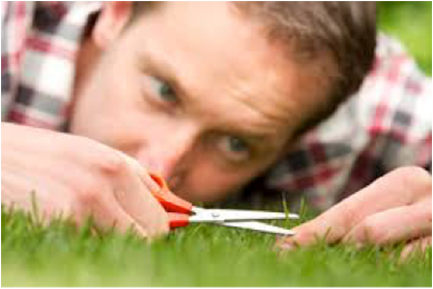
In my book Hide Your Goat, one of the many points I make is: “People tend to criticize most loudly in the area in which they have the deepest emotional need.” What do I mean by that?
In explaining this, I am reminded of an old neighbor growing up on Chestnut Drive who was obsessed with her lawn. By using the word “obsessed,” I am being understated in my description. She was the kind of person who, I am sure, had a name or number for every three-foot section of her lawn. She examined her 50’ x 100’ plot with a zealousness that could only be described as a drill sergeant. If she could have, she would have worn a grass-green uniform and chrome helmet as she marched up and down her expanse of land with a weed puller and lawn shears in hand. If you hit a whiffle ball into her yard by accident, you didn’t dare step on her grass to retrieve it. You did not step one foot in her back, front or side yard.
Her behavior might have been just a wee bit eccentric and the cause of gentle ribbing if she didn’t suffer from a more serious character flaw: She loved to find fault with everyone else’s yard. She was not shy about letting everyone and anyone know. Sometimes she even found fault with other things: the neighbor’s dented trash bins, unwashed cars in driveways, dirty gutters and other neighboring home improvement issues. In other words, she would find fault with any home not up to her rigorous standards. She would make any homeowners association covenants look substandard compared to what she expected.
Whose Side Are You On?
When things were “going right”—that is, when things were up to her standards with your property—she could be your best friend. Indeed, she was more than willing to gossip to you about others on the block.
She lost no time soliciting your support when she needed to complain about how disgusting a neighbor’s lawn appeared or how the paint was peeling from their trim. Over time, her gossiping extended to overheard conversations within the neighbors’ homes, the way their children behaved or even gossip about the way one of the neighbors appeared. (“He looks sickly. I wonder if he has a disease!”)
The problem one always had with this person was that you just knew, sooner or later, that her wrath would come back around to you.
Weeds Are Not Always Bad
To use goats as a metaphor, I did quite a bit of research when writing my book. One interesting fact I found out was that goats don’t like grass all that much. They love weeds. They are drawn to weeds; the more obnoxious the weed, the better. The goats will cut the lawn only after they have gone after the weeds.
As a youngster, I considered this old neighbor as an old goat. (Sorry, just being transparent.) She was the kind of person who found fault with everything everywhere and was especially mean-spirited towards children. You could have a beautiful lawn with an errant dandelion or two, and she would only see the dandelion. If a neighbor had lost a job and could not afford to paint the trim, she could not allow that there were extenuating circumstances. There was no latitude for any weeds, literally or metaphorically.
The neighbor wanted perfection, and she could not have it in her own life, so she focused on the faults and flaws of others. Without spreading gossip of my own, I will only share that, as I grew older, I found out she was estranged from her family.
She needed the love and warmth of others. She needed closeness, and yet she did everything in her power to avoid vulnerability. Contradictorily, it was not about her lawn at all, but about a need to control everything and everybody around her lest she admit that she was far from perfection herself. I cannot imagine how sad her life was, but I can imagine how lonely her life had become.
Weeds are survivors designed to live in conditions that do not favor most other plants. However, a “weed” is not always bad. Perhaps the best definition of a weed is simply a plant that is out of place. The essence of life is not being perfect, impressing people or succeeding at everything. The essence of life is simply making mistakes and learning from them and surrounding yourself with people who are not perfect. Imperfections are not inadequacies; they are reminders that we are all in this together.
We all have a few dandelions here and there, but it doesn’t make us bad. It simply makes us imperfectly perfect.
For more information about Hall of Fame speaker and bestselling author Steve Gilliland, please contact: steve@stevegilliland.com / 724-540-5019 / www.stevegilliland.com.